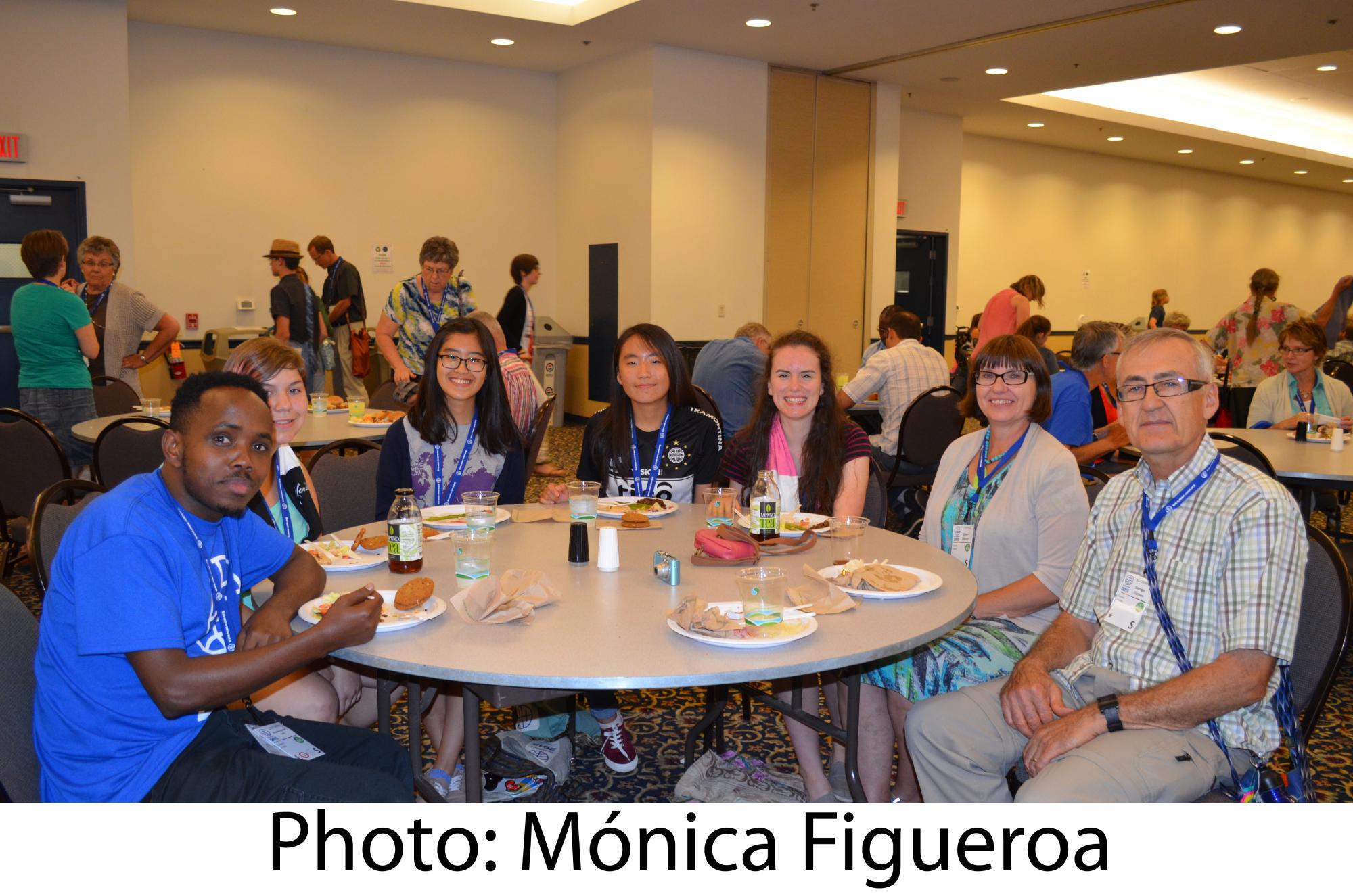Winnipeg, Canada – Mass events can leave behind a mountain amount of trash. But at Mennonite World Conference’s 16th Assembly in Harrisburg, 21–26 July 2015, the management of garbage was an expression of worship to God the creator.
Assembly organizers “decided early on that we would attempt to make the conference environmentally friendly to the degree that it was economically possible,” says national coordinator Howard Good.
Fresh air
The selected venue, the Farm Show Complex has a comprehensive recycling plan, a 1.8kw wind turbine and 125kw photovoltaic solar energy generation system and a 30,000 gallon rainwater recovery tank to capture roof runoff.
Chief international events officer Liesa Unger worked with the engineering team on the air conditioning “to create an environment that people around the world feel comfortable in.” In response to guests who left the cold building in the hot Pennsylvania summer, the team reduced the number of fans by half and raised the temperature several degrees.
Shuttle busses ferried guests between their accommodations and the convention events to reduce use of private vehicles.
Every registrant received a MWC-branded aluminum water flask fillable at one of 25 water stations throughout the building to replace disposable plastic bottles.
Even the convention bag was green. Local volunteers, including groups of Amish, sewed event bags at Mennonite Central Committee’s Ephrata Material Resources Center from donated fabric and discarded neckties. Matching the dimensions of the school kits sent overseas, the bags could be donated to MCC after the event.
But Good and his team went even further.
Eaten up after eaten on
With encouragement from the Mennonite Creation Care Network (MCCN), the planning committee made the extra investment to ensure that for the 39,000 meals, all plates, cutlery, napkins, cups, leftover food were fully compostable at a cost of about $0.60/meal.
Even the communion cups for Friday’s celebration of the Lord’s supper were compostable.
“Spread across 39,000 meals, [it] was not that expensive,” says Good. Savings in other areas mitigated higher costs incurred by the sustainability measures. Thirty volunteers at lunch and 40 every supper supplemented caterer Centerplate’s staffing needs. Local Mennonite agribusinesses donated some foodstuff or sold it to the caterer at reduced prices.
Over the course of the week at the Farm Show Complex, the Environmental Recovery Corporation trucked away almost 4.25 tons of waste Oregon Dairy Organics, a sister company to the Lancaster County farm and supermarket. There, the items were shredded, mixed with manure and periodically turned. After three months, this was blended with soil for use in landscaping and erosion control.
There were bumps along the way. “We discovered it was much easier for people to comingle regular trash and compostable trash than we realized,” said Good. Recyclable trash also found its way into compost receptacles. One container, refused because too much non-compostable material was mixed in, had to be incinerated.
 Educating eaters
Educating eaters
“Initially, the sorting made little sense to convention goers,” says Marlisa Yoder Bontrager. With five members of her family, she volunteered at disposal stations during meals at Assembly to help diners sort out their garbage from compostable items.
The Assembly team also produced more signage and an explanatory video to help guests discern which materials were recyclable, compostable or just plain garbage.
“Once they understood the process, many shared feelings of relief and appreciation when they realized that their trash wasn’t going to a landfill,” says Yoder Bontrager.
Cooperation
The cooperation of leadership from the Farm Show Complex was key to the success of the ambitious waste reduction strategy, says Good.
Sharon Altland, executive director of the Farm Show Complex, says they do their best to accommodate client requests. Centerplate, the onsite catering contractor, used their broad food services network to find a reliable vendor able to meet MWC’s needs.
The venue already prioritizes green initiatives, but “working with Mennonite World Conference opened the doors to yet another conversation,” says Altland. “We are working to take steps to reduce food waste and are in conversations with the food vendors for the 100th Farm Show to capture prep waste.”
“The fact that 4.25 tons less [garbage] was hauled [to the incinerator] is a huge accomplishment,” says Altland.
“[Assembly planners] were willing to grapple with the gap that sometimes exists between best environmental practices and convenience – and then made it work for a huge gathering,” says Yoder Bontrager who is also a member of MCCN’s council. “They reflected in practice…an important commitment: growing in our dedication to care for God’s creation as an essential part of the good news of Jesus Christ.”
“Even though being responsible can mean higher costs, good planning in other areas can make it all affordable,” says Good.
—MWC Release by Karla Braun